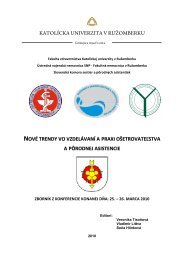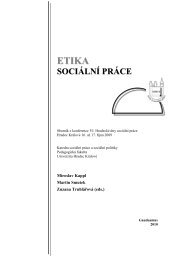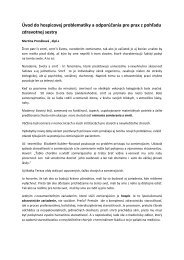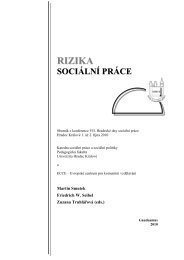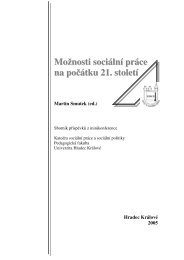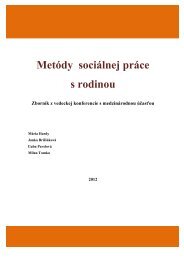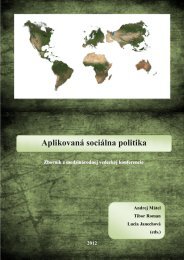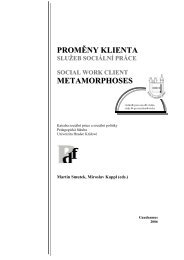Zmena klÃmy â možný dopad (nielen) na obyvateľstvo - Prohuman
Zmena klÃmy â možný dopad (nielen) na obyvateľstvo - Prohuman
Zmena klÃmy â možný dopad (nielen) na obyvateľstvo - Prohuman
Create successful ePaper yourself
Turn your PDF publications into a flip-book with our unique Google optimized e-Paper software.
ities and their limited adaptive capacity need to be factored into climate change<br />
responses and policy decisions. Compared to adults, children are more susceptible<br />
to adverse environmental conditions such as contami<strong>na</strong>ted water, extreme heat<br />
and floods, disease outbreaks, etc., and they also have fewer resources and means<br />
to be able to independently respond to these conditions and care for themselves.<br />
There is increasing evidence that many of the main causes of death for children,<br />
such as diarrhoea, malnutrition and mosquito-borne diseases, are exacerbated<br />
by climate change. Climate change is likely to also affect education by making it<br />
more difficult for children to attend school. Gender inequality may increase, as<br />
more parents may be inclined to keep the girls at home rather than send them<br />
to school if their safety is perceived to be at risk in times of climate hazards. In<br />
the face of reduced food security and incomes, parents can also withdraw their<br />
children from school. This can result in more inequalities and the perpetuation<br />
of inter-generatio<strong>na</strong>l poverty. Child protection is also under threat due to loss<br />
of livelihoods and socio-economic security, decreased social support networks,<br />
distress migration, etc.<br />
Climate change has serious implications for the availability, accessibility, equity<br />
and quality of public service provision. Currently, many basic social services in<br />
Cambodia lag behind <strong>na</strong>tio<strong>na</strong>l targets, norms and standards. Already wide gaps<br />
are noted in the key CMDG rights, most of which concern basic social services.<br />
Climate change could further widen the gaps in provision and worsen the situation<br />
of many children, pushing them further into the vicious cycle of poverty and<br />
deprivation. Inequalities and disparities persist in basic social service provision<br />
and outcomes.<br />
Priority concerns voiced by the children include:<br />
• Lack of access to water and irrigation infrastructure, threatening livelihoods and<br />
affecting food and income sources.<br />
• Insecure livelihoods, constraining access to education and exacerbating food deprivation.<br />
• Floods, which create physical barriers to access schools and pose safety and protection<br />
challenges for children when travelling to school.<br />
• Risk of abuse due to families migrating for work and income because of increasingly<br />
scarce food.<br />
• Insufficient participation in resource ma<strong>na</strong>gement decisions.<br />
Climate change affects the realization of children’s rights in Cambodia with<br />
damaging consequences, in particular for education, protection and participation:<br />
• Right to education: children spend more time in farming and non-farming activities<br />
(pumping water for the rice fields, etc.) and do not attend school.<br />
50





